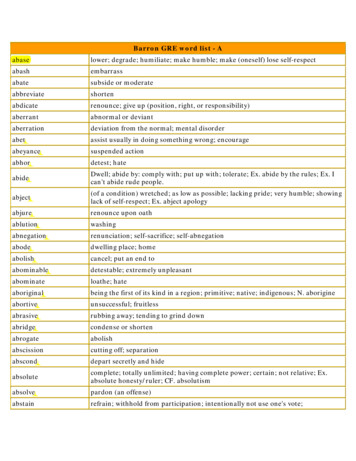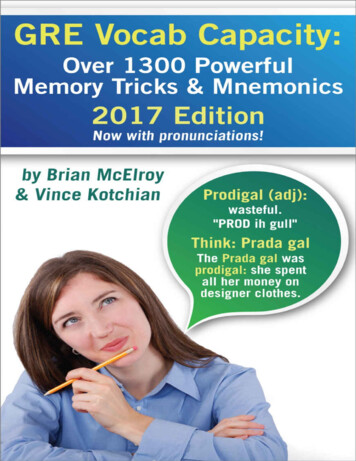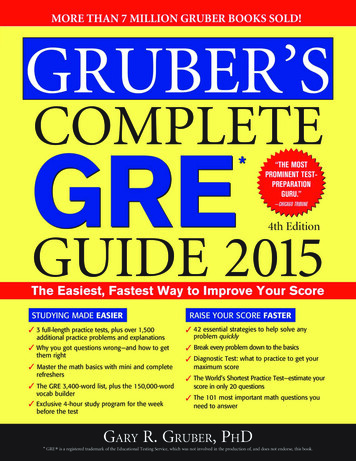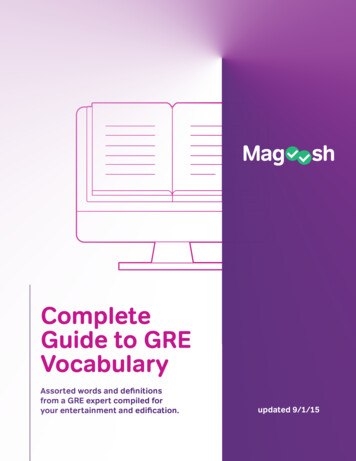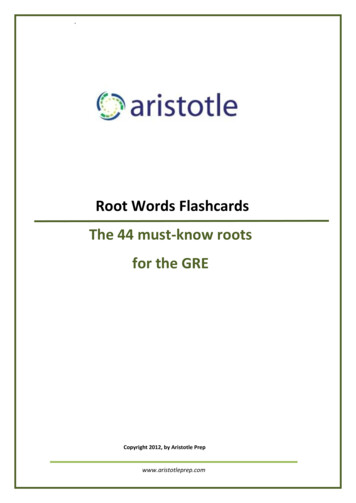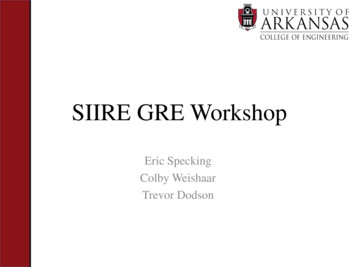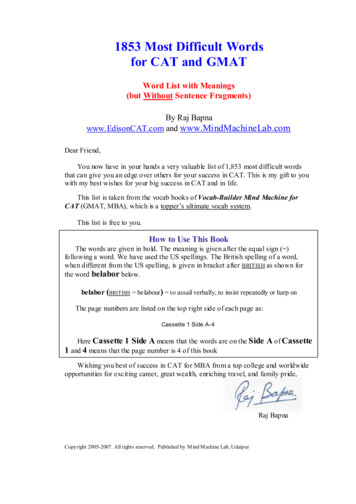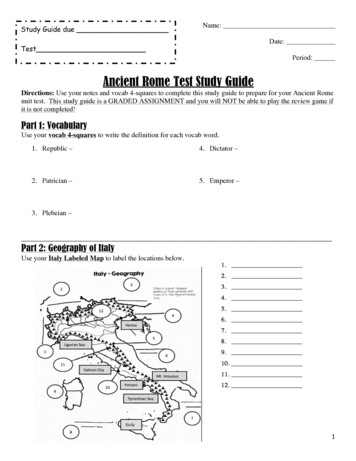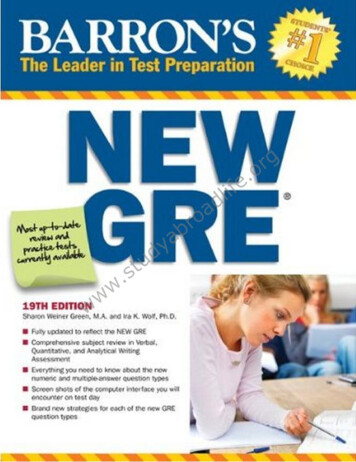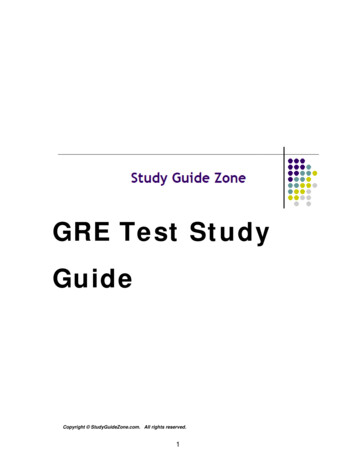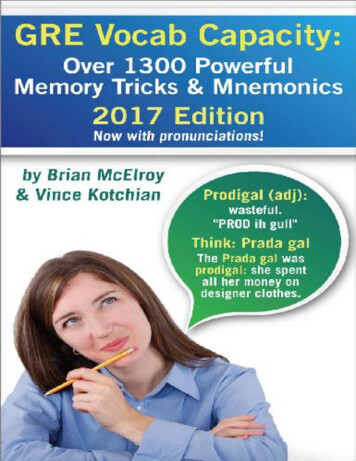
Transcription
GRE Vocab Capacity2017 EditionPowerful Memory Tricks and Mnemonics to Learn GREVocabulary WordsNow with more than 1,300 mnemonics!ByBrian McElroyandVince Kotchian
ContentsWhy This Book Is DifferentMnemonic ExamplesWord Root ExamplesHow To Use This BookOther TipsThe MnemonicsAppendix: Word RootsIndexAcknowledgmentsWhy This Book Is DifferentThere are tons of books, apps, and websites designed to help you learn GREwords. However, if you’ve tried typical vocabulary study methods, theymight not have worked very well for you.The problem with most vocabulary products is that the sentences in thebooks are boring! Your brain might not naturally form connections to themeanings of words if they’re not presented to you in a memorable, creativeway.
GRE Vocab Capacity is different. We’ve not only clearly defined the wordsbut we’ve also created sentences designed to help you remember the wordsthrough a variety of unusual associations - using mnemonics.Mnemonic ExamplesA mnemonic is just a memory device. It works by creating a link in yourbrain to something else, so that recall of one thing helps recall of the other.This can be done in many ways – but the strongest links are through senses,emotions, rhymes, and patterns.Consider this example:quash (verb): to completely stop from happening.Think: squash.The best way to quash an invasion of ants in your kitchen is simple:squash them.Now your brain has a link from the word quash (which it may not haveknown) to the word squash (which it probably knows). Both words soundand look the same, so it’s easy to create a visual and aural link. If youpicture someone squashing ants (and maybe get grossed out), you haveanother visual link as well as an emotional link.Here’s another example:eschew (verb): to avoid.Think: ah-choo!
Eschew people who say "ah-choo!" unless you want to catch their colds.The word eschew sounds similar to a sneeze (ah-choo!), so your brain willnow link the two sounds. If you picture yourself avoiding someone who isabout to sneeze in your face, even better! Again, the more connections youmake in your brain to the new word, the easier it will be for you to recall it.Word Root ExamplesWord roots are parts of words that often mean the same thing. For example,the root chron pretty much always has something to do with time:synchronize, chronological, etc. So knowing what word roots mean can beuseful in helping you learn words. They can also provide a hint for themeaning of words that you don’t know.However, English is a funny language, and roots don’t always have thesame meaning - it can depend on what word they’re in. So what youshouldn’t expect from roots is that they’ll be reliable to help you determinethe definition of a word you don’t know. Keep in mind that knowing yourword roots is not a substitute for knowing the actual definitions of words.We’ve included an appendix with this book that lists many common wordroots along with their usual definitions, and an easy example word that usesthe root. For example:chron: time.Think: chronological: arranged in order of time.We recommend learning all the word roots if you have time. It may behelpful to learn all the word roots first and then begin learning words youdon’t know, looking for instances of the roots to help you learn the newwords.
Word Root Tip: the more letters you can match from the beginning of aword you do know to a word you don’t know, the more likely it is they havesimilar meanings. Matching five or more letters is a good benchmark.For example, if you know that pacifist has to do with being peaceful, you’dbe right in guessing that pacific has a similar meaning since they both startwith pacifi.How To Use This BookOne tool we recommend is periodic review of flashcards. The "tactilelearning" (in other words, learning by doing) aspect of making your owncards is very effective. Buying pre-made flashcards skips this step, and youmiss out on an opportunity to "write it down in your head" by physicallywriting the words and definitions down yourself.Here’s an example of what a flashcard might look like:
Notice that the front of the card just has the word with its pronunciation.Using the word when talking to someone that day will help you learn it.The back of the card contains a brief definition, a mnemonic (which youcan invent or find in this book), a sentence using the word in a way thatcalls to mind its meaning, and any synonyms of the word you’d also like tolearn (try an online dictionary like m-w.com to look up synonyms of aword).Here’s a method and chart that describe the order with which to study yourcards:1) Create 50 custom vocabulary flashcards:a) Side A shows the word and its pronunciation.b) Side B shows the definition, part-of-speech,mnemonic, sample sentence, and synonym(s).2) Label the cards with numbers 1-50 and stack them inorder.3) Use the table below to decide which cards to study andreview each day.
Other Learning TipsFor troublesome words - or for any word you want to be sure of - werecommend writing down the word’s definition in your own words, thenmaking up your own sentence using the word. Until you can explainsomething in your own words, you probably don’t fully understand it, and
your own definitions and sentences will often be more memorable thanours.Some people go straight to the most bizarre looking words in the book, butdon’t overlook the words that you “kind of” know but can’t easily define.That goes for words outside this book, too. If you can’t easily define a wordyou see in the newspaper, for instance, look it up! The context you read it inwill help you learn it.For words that just won’t stick in your brain, try associating a movementwith the word. Making a specific gesture with your body every time youstudy the word will provide an additional connection in your memory.A few more suggestions:Modify it. If you don't like our mnemonic or think that it can be improved,then use your own. They are your own customized cards to do with whatyou like. Even draw a picture or make a collage if it helps.Shuffle. When studying a group of cards, don’t always study them in thesame order, so your brain won’t be able to associate one card with another.Study before bed. Studies have shown that memorization-type tasks arebest studied during the hours preceding a full night's sleep. One populartheory to explain this phenomenon is that when we sleep, our mindorganizes the day's events, starting with the most recent ones.One last tip: use it or lose it! The more you can work your new vocabularyinto your daily speech and writing, the more you’ll remember it. You mightsound nerdy, but it’s worth it.Our hope is that this book not only helps you improve your vocabulary, butalso inspires you to start creating your own mnemonics!- Brian and Vince
P.S. - We encourage you to write a review of GRE Vocab Capacity onAmazon.com to tell others about your experience with the book.Please contact us directly for suggestions that you might have so we canimprove the book for future readers.We’re also available for private tutoring of the GRE, as well as the GMAT,SAT, ACT, and ISEE - either in person (in San Diego) or online (viaSkype).mcelroy@post.harvard.edu (Brian McElroy)vince@vincekotchian.com (Vince Kotchian)www.McElroyTutoring.com or vincekotchian.comThe Mnemonicsabase (verb): to humiliate or degrade. “uh BASE”Think: give up a base.When you’re making out with someone, if you give up a base too quickly,then you just abase yourself.abashed (adjective): embarrassed. “uh BASHED”Think: Bashful the dwarf.When Snow White kisses him, Bashful gets so abashed that he blushes.abate (verb): to reduce. “uh BATE”
Think: rebate.It may be annoying to have to mail it in, but the rebate on the new cellphone will abate its cost.aberration (noun): an exception or departure from the norm. “ah (rhymeswith “nah”) burr A shun”Think: a bare Asian.Seeing a bare Asian would be an aberration – most people in Asia wearclothes.abeyance (noun): temporary inactivity; suspension.“uh BAY ants”Think: “obey” ends.When our lieutenant’s command to obey ends, our work plans are held inabeyance because we’re lazy.abhor (verb): to hate. “ab WHORE”Think: ab-whore.Daria abhors the tube-top-wearing blonde who stole her boyfriend andrefers to her as an "ab-whore".abject (adjective): miserable; wretched. “ab-JEKT”Think: rejects.
If she rejects my marriage proposal, I’ll be abject, with nothing to live for.abnegate (verb): to give up something; to deny oneself something. “ab nuhGATE”Think: abs negated.If you abnegate food, the fat covering your abs will get negated.abomination (noun): something awful.“uh BOM in A shun”Think: bomb a nation.It is an abomination to bomb a nation: civilians get killed.aboriginal (adjective): existing since the beginning.“AB or IDGE in ul”Think: original.In Australia, the original natives are the Aborigines - they are aboriginalsince they were its first inhabitants.abort (verb): to end prematurely. “uh BORT”Think: abortion.An abortion can abort a pregnancy.abound (verb): to be numerous. “uh BOUND”
Think: abundant.Kangaroos abound in Australia; they’re abundant, bouncing aroundwherever you look.abrasive (adjective): causing irritation. “Uh BRAY sive”Think: braying donkey.Adopting a homeless donkey seemed great until I realized it would wakeme up every morning with its abrasive braying.abridge (verb): to shorten. “uh BRIJ”Think: a bridge.A bridge would abridge my commute, which involves driving around thecanyon.abrogate (verb): to get rid of; to abolish. “AB roh gate”Think: a broken gate.After my 120 lb. Mastiff decided to abrogate the barrier to the kitchen andeat from the garbage, we were left with a broken gate.abscission (noun): the shedding of leaves, flowers, or fruits. “ab SIZH un”Think: scissors.
Instead of waiting for the grapes to drop off of the vines, speed up theabscission by getting out there with a pair of scissors.absolute (adjective) complete and total. “ab so LUTE”Think: Absolut Vodka.The reason Absolut Vodka is more expensive than most brands is itssuperior purity; it is literally absolute vodka.absolve (verb): to free from guilt; to forgive. “ub SOLVE”Think: dissolve.Catholics believe that confessing to a priest will dissolve their guilt andabsolve them from sin.abstemious (adjective): sparing; moderate.“ab STEM ee us”Think: abstinence.The health teacher knew that if he told students to be abstemious, some ofthem would still get pregnant, so he urged them to practice abstinence.abstruse (adjective): hard to comprehend. “ab STROOS”Think: abstract and confusing.The abstract strudel directions will confuse the new cook because they areabstruse.
abysmal (adjective): awful. “uh BIZ mull”Think: Pepto-Bismol.When I had food poisoning, my stomach felt so abysmal that I had to drinka bottle of Pepto-Bismol.accede (verb): to express approval for; to give into.“uh SEED”Think: agreed.Since we all accede to the plan to seed the garden, it looks like we'reagreed.accolade (noun): an expression of praise. “AK oh lade”Think: Escalade.I received many accolades for my service, but my favorite was the gift of abrand-new Cadillac Escalade.accretion (noun): growth via a gradual buildup.“uh CREE shun”Think: creeps up on.Gaining weight creeps up on a lot of people since they don’t notice theslow accretion of fat.accumulate (verb): to gradually increase.
“Ah KYOOM you late”Think: cumulus clouds.We better pack up this picnic and leave - those cumulus clouds areaccumulating and I think there’s gonna be a thunderstorm soon.acerbic (adjective): harsh; biting. “uh SIR bick”Think: acidic.On American Idol, Simon Cowell’s criticism was acerbic to the point ofbeing acidic.acidulous (adjective): somewhat harsh. “uh SID you luss”Think: acid-ish.I like Sour Patch Kids because their acidulous taste is acid-ish withoutbeing too painful.acme (noun): the highest point of something “ACK me”Think: acne.In high school, I was plagued by acne: the acme of my nose was often agiant zit.acquisitive (adjective): eager to acquire and possess; greedy. “uh QUIZ zittive”Think: a squid visited.
An acquisitive squid visited my house and wrapped his arms around all ofmy valuable Chinese porcelain.acrimonious (adjective): bitter. “ak rih MOAN ee us”Think: a crime on us.Committing a crime on us makes us acrimonious.acumen (noun): insightfulness. “AK you min”Think: accurate men.In business, accurate men usually have acumen.adamant (adjective): stubborn; unyielding. “AD uh mint”Think: Adam damn it!God was adamant that Adam not return to the Garden of Eden: “I said no,damn it!"adept (adjective): very skilled. “uh DEPPED”Think: adapt.Mountain lions can adapt to almost any climate and environment; they’readept at survival.adequate (adj): appropriate; good enough. “AD uh quit”
Think: had to quit.I had to quit at mile 15 of my marathon, but now that I think about it, 15miles is plenty adequate for a solid workout.adhere (verb): to stick to something. “ad HERE”Think: adhesive.The adhesive on the Band-Aid made it adhere to my finger.admonished (verb): warned to do what's best.“ad MON isht”Think: add Monistat."Add Monistat to your body if you're suffering from a vaginal yeastinfection," the ad admonished.adorned (adjective): decorated. “uh DORNED”Think: add ornaments.If you adore Christmas, then you probably enjoy adorning your home byadding ornaments to your tree.adroit (adjective): skillful.“uh DROIT” (rhymes with “Detroit”)Think: a Droid.
A Droid is an adroit cell phone since it can do so much.adulation (noun): excessive admiration. “ad joo LAY shun”Think: adult adoration.The grown adult’s adoration of role-playing video games could only becalled adulation.adulterate (verb): to corrupt; to make impure.“uh DULT er ate”Think: adultery.In The Bible, God said, "Thou shalt not commit adultery." because anaffair will adulterate a marriage.adversary (noun): an enemy or rival. “AD ver sare ee”Think: adversityIsrael faces more adversity than most countries; it is nearly completelybordered with adversaries.advocate (noun:) supporter, ally. “AD voh kit”Think: I voted.I voted in the election, proving I’m an advocate of our democracy.aegis (noun): protection. “EE gis”
Think: egg usGo ahead, try to egg us - our house has the aegis of the police, since mydad’s a cop.aesthetic (adjective): relating to beauty.“es THE tick” (rhymes with “pathetic”)Think: athletic body.If you're athletic, then you're likely to have a body that is aestheticallypleasing.affable (adjective): friendly. “AFF uh bull”Think: laughable.Since they want tourists to feed them, zoo giraffes are so affable that it'slaughable.affectation (noun): an artificial way of behaving.“aff eck TAY shun”Think: a fake fiction.Madonna's phony English accent is an affectation; it is a fake fiction.affiliated (adjective): related to, intertwined.“uh FILL ee ate ed”Think: Philly I ate.
When I went to Philly I ate a cheesesteak, because cheesesteaks areaffiliated with Philadelphia.affront (noun): an insult or offense. “uh FRONT”Think: afro in front.I have a huge afro, so if I sit in front of people at a movie, they often takeit as an affront.aggrandized (verb): made greater; enhanced.“uh GRAND ized”Think: a grand-sized.I aggrandized my social status by throwing a lavish party - it gave me agrand-sized reputation.aghast (adjective): struck by fear or amazement.“uh GASSED”Think: a ghost.I was aghast when I looked in the mirror and saw a ghost standing next tome.alacrity (noun): cheerful promptness. “uh LACK crih tee”Think: electricity.
Electricity has alacrity, since it only takes a millisecond for the light tocome on after I flip the switch.algorithm (noun): a mathematical formula or procedure.“AL guh rhythm”Think: Al Gore’s rhythm.It's an inconvenient truth that, on the dance floor, Al Gore's rhythm is asdull and predictable as a computer algorithm.alleviate (verb): to soothe or lessen the severity of.“uh LEAVE ee ate”Think: Aleve.Allison’s headache was so bad that she took four Aleve pills to alleviate thepain.allusion (noun): an indirect reference. “al LEW shun”Think: A lewd sin.“Adjusting the antenna” is one of the funnier allusions to what some mightconsider a lewd sin.altruistic (adjective): unselfish concern for others.“al true IST ick”Think: always true stick.
My wingman is altruistic: he’s always true to me and will stick by myside when I hit on chicks - even if he’s not interested in any of them.amalgamate (verb): unify; join parts into a whole.“uh MAL gum ate”Think: gum.After breaking the vase, Malcolm used gum to amalgamate the piecesback together.ambiguity (noun): The state of being unclear or ambiguous. “am big YOUit ee”Think: a big “U” for undecided.When it came time to indicate her political party on the ballot, Virginiachecked neither a big “D” for Democrat, nor a big “R” for Republican, butinstead, a big “U” for undecided due to her ambiguity.ambivalence (noun): contradictory feelings toward something. “am BIV ullents”Think: valence electron.The valence electron was ambivalent about which electrons he wanted topair off with. According to his mother, he was unsure and afraid ofcommitment.ameliorated (verb): made better. “uh MEAL ee or ate id”Think: Emilio rated.
Emilio rated my pasta as a 10 out of 10, which ameliorated my fear that Ihad ruined it.amenable (adjective): willing; cooperative.“uh MEN uh BULL”Think: amen-able.After she shouted "amen!", I was able to tell that she was amenable to myplan.amicable (adjective): friendly. “AM ick uh bull”Think: hammock-able.When Amy reminded me that her hammock was able to hold two people, Iknew that she was amicable.amortize (verb): to gradually pay off or reduce.“am MORT eyes”Think: a mortgage.Unless you have a ton of money, when you buy a house, you probablyamortize the loan with a mortgage.ample (adjective): enough or more than enough.“AM pull”Think: Apple.
With about 200 billion in cash reserves (in 2015), Apple has ampleresources.anachronism (noun): something belonging to a different time period. “anNACK ron is im”Think: inaccurate chronology.The movie has something inaccurate about its chronology: a cavemanwearing a watch - a huge anachronism.analogue (noun): something similar. “an al LOG”Think: Analog vs. Digital.My audiophile cousin swears that analog is way better than digital, but tome they sound pretty similar.anathema (noun): something hated; a curse.“uh NATH em uh”Think: a nasty enema.If a patient is constipated, then a nasty enema may follow, which can beanathema for the nurse.anile (adjective): senile. “ANN ile” (rhymes with “dial”)Think: senile.I knew my Aunt Ann was anile to the point of being senile when she askedto go swimming in the Nile.
animosity (noun): hatred; hostility. “an ih MOSS ih tee”Think: enemy city.During the war, I accidentally parachuted into the enemy city and was metwith animosity.annotation (noun): a comment or note on a literary work.“ann oh TAY shun”Think: a notation.There are lots of annotations in my copy of Hamlet; I made a notationevery time I needed to define an unfamiliar term.annul (verb): to cancel. “ann ULL”Think: null set.In mathematics, the null set means “a set that contains nothing.” If youannul (cancel) your marriage, you end it.anodyne (noun): a pain-reliever. “ann oh DINE”Think: am not dying.I have the flu, but my doctor-prescribed anodyne finally has made me feellike I am not dying.anomaly (noun): something unusual. “uh NOM uh lee”
Think: abnormally knobby knee.I have an abnormally knobby knee; my doctor tells me it’s an anomaly.antedate (verb): to come before. “AN tuh date”Think: auntie ante- (before) date.Chances are that your auntie has a birth date that antedates yours.antediluvian (adjective): ancient; primitive.“ann tee die LOUVE ee in”Think: anti-dildo-lovin’.Only someone with antediluvian views on sex would be anti-dildo-lovin'.antipode (noun): the exact opposite. “ANN tih pode”Think: anti-pole.The North Pole is the antipode to the South Pole - you might say they're"anti-poles."antithesis (noun): opposite. “ann TITH uh sis”Think: anti-thesis.You got a "D" on your essay because your examples argued for theantithesis of your introduction's thesis.
apace (adverb): quickly. “uh PACE”Think: keep pace.The Indy 500 racer's pit crew changed his tires apace so he could keeppace with the leaders.apartheid (noun): the policy of separating groups based on race. “uh PARthighed”Think: apart to hide.In South Africa, apartheid kept blacks apart to hide them from racistwhites.aplomb (noun): confidence. “uh PLOM”Think: the bomb.If you have aplomb, you think you're the bomb.apocryphal (adjective): of doubtful truthfulness.“uh POCK rih full”Think: apocalypse predictions.The prediction that the apocalypse would happen in 2012 turned out to beapocryphal.apoplectic (adjective): enraged. “ah puh PLEK tick”
Think: Apu epileptic.In the Simpsons, when Nelson robbed his Kwik-E-Mart, Apu shook withapoplectic rage as if he was having an epileptic seizure.apostle (noun): a supporter. “uh PAH sill”Think: A posse.The famous rapper was known to roll deep with his many apostles – hisposse, that is.apothegm (noun): a short, wise remark. “APP uh THEM”Think: pocket the gem."Pocket the gem!" is a good apothegm to remember if you’re training tobe a jewelry store robber.apotheosis (noun): a perfect example. “uh POTH ee oh sis”Think: a potent thesis.My professor said he gave me only A in the class because my paper was theapotheosis of a persuasive essay: it had a potent thesis.appease (verb): to soothe, satisfy or pacify. “uh PEAS”Think: please with peas.I appease and please my baby daughter by hiding her peas inside of hermashed potatoes.
apportion (verb): to divide and distribute. “uh POOR shun”Think: a portion.If you want a portion of lunch, go ask the lunch lady - she apportions it toeveryone.apposite (adjective): appropriate. “APP uh sit”Think: a positive site.Wikipedia is a positive site because it’s apposite for all kinds of research.approbation (noun): approval; praise. “app pro BAY shun”Think: approve probation.Maybe the best approbation I ever received was when the judge finallyapproved me for probation.apropos (adjective): relevant. “app pro POH”Think: appropriate.It’s apropos and appropriate that we’re talking about posing because Iwas just discovered and contracted to be a model!arbitrary (adjective): done without reason; random.“ARE bit TRARE ee”
Think: varies a bit.When I order a pizza, the amount of toppings I get often seems prettyarbitrary – it always varies a bit.arcane (adjective): mysterious; known only to a few.“are CANE”Think: Ark of the Covenant.Indiana Jones understood the arcane Ark of the Covenant; the Nazis didnot, which is why they perished.arch (adjective): sassy. “arch”Think: arched eyebrow.Her playful, arch comment made me arch my eyebrow.archaic (adjective): no longer current; outdated.“are KAY ick”Think: arch age.I knew you time-traveled here from the Roman Empire because yourarchaic expressions sound like you’re from the arch age.arduous (adjective): strenuous; difficult. “ARE joo us”Think: hard for us.
Clearing out that hoarder’s house is arduous; it’s hard for us because hekept every piece of junk mail he ever received.arid (adjective): very dry. “AIR rid”Think: Arrid Extra Dry.“Get a little closer; don't be shy! Get a little closer, with Arrid Extra Drydeodorant (which keeps your armpits arid)!”arrogate (verb): to unrightfully take or claim.“ARE uh gate”Think: a rogue ate.My liege – a rogue ate my rations – may I have more since he arrogatedwhat was rightfully mine?articulate (adjective): using clear, expressive language.“are TICK you lit”Think: article.Oscar Wilde was so articulate that his conversational speech could be usedas a newspaper article without any editing.artifice (noun): deception; trickery. “ART ih fiss”Think: artificial.In The Hunger Games, Effie Trinket tries to win people over with artifice,but it doesn’t work because her sweetness is so artificial.
artless (adjective): simple; without cunning. “ART less”Think: art-less flirting.Flirting is an art I use less than most people; it’s definitely pretty artlesswhen I just go up to a girl and tell her I like her.ascendancy (noun): governing or controlling influence. “Uh SEND andsee”.Think: ascend and see.In battles, armies strive to take hills: ascending to higher ground makes iteasier to see one’s enemy and leads to tactical ascendancy.ascetic (adjective): practicing self-denial. “uh SET ick”Think: asset? ick!The ascetic Buddhist monk, when offered the chance to take money oranother asset, said “ick!”ashen (adjective): very pale. “ASH in”Think: ash.When he saw the ghost, his complexion became so ashen that his face wasthe color of ash.askew (adjective): slanted to one side. “uh SKEW”
Think: skew.Your picture is askew because the earthquake skewed it from hangingevenly.asperity (noun): bad temper. “ass PEAR it ee”Think: a spear in me.I have asperity because I have a spear in me – can you blame me?aspersion (noun): a false claim intended to harm.“ass SPUR shun”Think: asp poison.Her aspersions about what I did last night felt like asp poison.aspiration (noun): a hope or ambition. “asp ear A shun”Think: as a pirate.As a pirate, I’ll be able to fulfill my aspiration of sailing the high seas androbbing the rich.assail (verb): to attack violently. “ass SALE”Think: ass sail.Come at me, bro: if I assail you, I'll make your ass sail out the window.
assiduous (adjective): hardworking; dedicated.“ass SID you us”Think: assist us.Assiduous Sid worked his ass off to assist us.assuage: (verb): to make less severe. “uh SWAJ”Think: massage.astray: (adj): away from the correct path; into error.“ass TRAY”Think: a stray dog.A stray dog has gone astray from its family.astute (adjective): clever. “ass TOOT”Think: SAT student.I had an SAT student named Stu who was so astute that he got a 1600 onthe SAT.attenuate (verb): to reduce. “at TEN you ate”Think: ten to eight.If you go from ten drinks a week to eight drinks a week, then you’veattenuated your number of beverages.
audacious (adjective): fearlessly bold; arrogantly bold.“awe DAY shus”Think: awed us.Walking up to Obama and swiping his pen as he was about to sign the billwas so audacious that it awed us.augment (verb): to increase the size of or to improve.“awwg MEANT”Think: Aug. meant.The arrival of Aug. meant that the colonists could augment their foodstorage by harvesting maize.august (adjective): majestic. “awe GUST”Think: Augustus Caesar.Augustus Caesar, the first Roman emperor, was so august that they nameda month after him.auspicious (adjective): favorable. “awe SPISH us”Think: suspicious I’m awesome.Dude, the chances she'll go out with me are auspicious or "awe-spicious"because I'm suspicious that I'm awesome.
austere (adjective): plain; strict; serious; cold. “awe STEER”Think: Austria stern.Life among the Alps in Austria is stern and austere - it's hard to partywhen there's a wind chill of -20.authoritative (adjective): having impressive knowledge about a subject;confident. “Auth OR it tay tive”.Think: author.The reason we can speak authoritatively about GRE Vocab Capacity is thatwe wrote it: we’re the authors.automaton (noun): one who acts in a robotic way.“awe tah mah tahn” (rhymes with “on”)Think: automation.Working on assembly line where automation has replaced creativity canmake you feel like an automaton.autonomous (adjective): operating independently.“awe tahn nom us”Think: Auto no mo’ us.With the advent of self-driving autos like the Google car, the cars won’t beneeding us no mo’.avaricious (adjective): greedy. “ave uh RISH us”
Think: have our riches.My boy band and I don't trust you as an agent - you're avaricious and justwant to have our riches.aver (verb): to state confidently; to declare. “uh VAIR”Think: verify.After I verify that the blood sample from the crime scene matches yourDNA, I’ll aver that you are the killer.aversion (noun): A tendency to avoid or dislike.“uh VER shun”Think: cover versions.I have an aversion to cover versions of songs – I almost always prefer theoriginal tune.avuncular (adjective): like an uncle. “uh VUNK you lure”Think: uncle.The avuncular professor was like an uncle to him, dispensing wellintentioned advice.badger (verb): to annoy or pester. “BAD jur”Think: bad jerk.
Good jerks can get laughs, but a bad jerk will just badger you with hisattempts at humor.baleful (adjective): threatening harm. “BALE full”Think: Christian Bale.I’m not a big Christian Bale fan – he always has that baleful look on hisface, like he wants to start a fight with you.banal (adjective): unoriginal. “buh NALL”Think: ban all.The banal librarian thought there were enough books already and wanted toban all the new ones.base (adjective): not honest or good; having low quality or value. (rhymeswith “face”)Think: basement.I live in my mom’s basement, but I don’t list that on my OkCupid profile:there’s an unfortunate stereotype that people who live in basements tend tobe base.battery (noun): a large group of similar things. “BAT er ee”Think: batter - y.I thought that my first mix of cupcake batter tasted a little too batter-y, so Iput it through a battery of taste tests before baking my final batch.
bauble (noun): a small, inexpensive piece of jewelry or toy.“BAW bull”Think: bobblehead.The bauble that my favorite baseball player gave me was a bobblehead ofhimself.baying (verb): shouting. “BAY ing”Think: Michael Bay movie.Even though I was in the other room, I could tell my roommates werewatching a Michael Bay movie, like Transformers, because of all thebaying from the T.V.beatific (adjective): extremely happy. “bee TIH fick”Think: beautiful! terrific!If you feel beatific, you probably walk around exclaiming, “beautiful!terrific!” all day.beatify (verb): to bless; to make happy. “BEE tih fie”Think: beautiful home happiness.The makeover will beautify your home and beatify your family.becalm (verb): t
P.S. - We encourage you to write a review of GRE Vocab Capacity on Amazon.com to tell others about your experience with the book. Please contact us directly for suggestions that you might have so we can improve the book for future readers. We’re also available for private tutoring of the GRE, as well as the GMAT,
